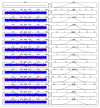Effects of Nutritional Supplements on Endurance Performance and Subjective Perception in Athletes Exercising in the Heat: A Systematic Review and Network Meta-Analysis
- PMID: 40647246
- PMCID: PMC12252039
- DOI: 10.3390/nu17132141
Effects of Nutritional Supplements on Endurance Performance and Subjective Perception in Athletes Exercising in the Heat: A Systematic Review and Network Meta-Analysis
Abstract
Objectives: This study aimed to evaluate the efficacy of various nutritional supplements in enhancing endurance performance and subjective thermal perception in athletes exposed to high-temperature environments through a systematic review and network meta-analysis. Methods: A comprehensive search was conducted in PubMed, Embase, Web of Science, Cochrane Library, and EBSCOhost from inception to January 2025. Studies were included if they evaluated the effects of nutritional supplements on either endurance performance or subjective thermal perception in athletes under heat stress. Two independent reviewers screened the literature, extracted data, and assessed the risk of bias. A network meta-analysis was performed using R software (version 4.3.1). The search was limited to English-language publications and employed both MeSH and free-text terms related to "athletes," "nutritional supplements," and "exercise performance," using Boolean operators (AND/OR) to construct the strategy. Results: Twenty-five randomized controlled trials (RCTs) involving 552 participants were included, yielding 22 comparisons: 18 assessed endurance performance, and 11 assessed subjective perception. Standardized mean differences (SMDs) and posterior probabilities (P-scores based on Bayesian ranking) were calculated using random-effects and Bayesian models. Menthol (SMD = -1.83, 95% CI [-3.15, -0.51]; P-score = 71.04%) and taurine (SMD = 0.91, 95% CI [0.08, 1.73]; P-score = 12.75%) demonstrated significant positive effects on endurance. Menthol energy gel showed the greatest improvement in thermal comfort (SMD = 2.14, 95% CI [1.01, 3.26]; P-score = 99.54%). Conclusions: Menthol and taurine appear effective in enhancing endurance in hot environments, while menthol energy gel substantially improves perceived thermal comfort. Future research should apply stricter controls regarding environmental conditions, supplement dosage, and participant characteristics. While individual supplements may offer limited benefits, synergistic combinations may yield greater improvements in performance and comfort.
Keywords: athletic performance; endurance performance; network meta-analysis; nutritional supplements; thermal comfort; thermoregulation.
Conflict of interest statement
The authors declare no conflicts of interest.
Figures











Similar articles
-
Ergogenic effects of supplement combinations on endurance performance: a systematic review and meta-analysis of randomized controlled trials.J Int Soc Sports Nutr. 2025 Dec;22(1):2524033. doi: 10.1080/15502783.2025.2524033. Epub 2025 Jul 6. J Int Soc Sports Nutr. 2025. PMID: 40619880 Free PMC article.
-
Effects of different dietary supplements on athletic performance in soccer players: a systematic review and network meta-analysis.J Int Soc Sports Nutr. 2025 Dec;22(1):2467890. doi: 10.1080/15502783.2025.2467890. Epub 2025 Feb 19. J Int Soc Sports Nutr. 2025. PMID: 39972597 Free PMC article.
-
Enhancing athletic performance: the critical role of oral health in sports.Evid Based Dent. 2025 Jun;26(2):105-106. doi: 10.1038/s41432-025-01157-0. Epub 2025 May 13. Evid Based Dent. 2025. PMID: 40360821 Free PMC article.
-
Advantages of different dietary supplements for elite combat sports athletes: a systematic review and Bayesian network meta-analysis.Sci Rep. 2025 Jan 2;15(1):271. doi: 10.1038/s41598-024-84359-3. Sci Rep. 2025. PMID: 39747536 Free PMC article.
-
Effects of Beetroot Juice on Physical Performance in Professional Athletes and Healthy Individuals: An Umbrella Review.Nutrients. 2025 Jun 9;17(12):1958. doi: 10.3390/nu17121958. Nutrients. 2025. PMID: 40573069 Free PMC article. Review.
References
Publication types
MeSH terms
Grants and funding
LinkOut - more resources
Full Text Sources
Medical

